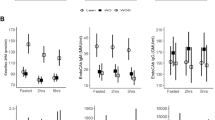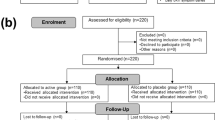Abstract
Background/objectives:
Obesity and metabolic disorders are linked to inflammation via gut microbiota and/or gut permeability. Gut-derived endotoxin triggers inflammation leading to metabolic syndrome (MetS) and contributing to oxidative stress. We intended to investigate the effect of Lactobacillus casei Shirota on gut permeability, presence of endotoxin and neutrophil function in MetS.
Subjects/methods:
Patients with MetS were randomized to receive 3 × 6.5 × 109 CFU L. casei Shirota (probiotic group) or not for 3 months. Gut permeability was assessed by a differential sugar absorption method and by determination of diaminooxidase serum levels, endotoxin by an adapted limulus amoebocyte lysate assay, neutrophil function and toll-like receptor (TLR) expression by flow cytometry and ELISA was used to detect lipopolysaccharide-binding protein (LBP) and soluble CD14 (sCD14) levels.
Results:
Twenty-eight patients and 10 healthy controls were included. Gut permeability was significantly increased in MetS compared with controls but did not differ between patient groups. None of the patients were positive for endotoxin. LBP and sCD14 levels were not significantly different from healthy controls. High-sensitive C-reactive protein and LBP levels slightly but significantly increased after 3 months within the probiotics group. Neutrophil function and TLR expression did not differ from healthy controls or within the patient groups.
Conclusions:
Gut permeability of MetS patients was increased significantly compared with healthy controls. L. casei Shirota administration in the MetS patients did not have any influence on any parameter tested possibly due to too-short study duration or underdosing of L. casei Shirota.
This is a preview of subscription content, access via your institution
Access options
Subscribe to this journal
Receive 12 print issues and online access
$259.00 per year
only $21.58 per issue
Buy this article
- Purchase on Springer Link
- Instant access to full article PDF
Prices may be subject to local taxes which are calculated during checkout


Similar content being viewed by others
References
Tilg H, Kaser A . Gut microbiome, obesity, and metabolic dysfunction. J Clin Invest 2011; 121: 2126–2132.
Wellen KE, Hotamisligil GS . Inflammation, stress, and diabetes. J Clin Invest 2005; 115: 1111–1119.
Backhed F, Manchester JK, Semenkovich CF, Gordon JI . Mechanisms underlying the resistance to diet-induced obesity in germ-free mice. Proc Natl Acad Sci USA 2007; 104: 979–984.
Ley RE, Backhed F, Turnbaugh P, Lozupone CA, Knight RD, Gordon JI . Obesity alters gut microbial ecology. Proc Natl Acad Sci USA 2005; 102: 11070–11075.
Cani PD, Amar J, Iglesias MA, Poggi M, Knauf C, Bastelica D et al. Metabolic endotoxemia initiates obesity and insulin resistance. Diabetes 2007; 56: 1761–1772.
Membrez M, Blancher F, Jaquet M, Bibiloni R, Cani PD, Burcelin RG et al. Gut microbiota modulation with norfloxacin and ampicillin enhances glucose tolerance in mice. FASEB J 2008; 22: 2416–2426.
Cani PD, Neyrinck AM, Fava F, Knauf C, Burcelin RG, Tuohy KM et al. Selective increases of bifidobacteria in gut microflora improve high-fat-diet-induced diabetes in mice through a mechanism associated with endotoxaemia. Diabetologia 2007; 50: 2374–2383.
Li Z, Yang S, Lin H, Huang J, Watkins PA, Moser AB et al. Probiotics and antibodies to TNF inhibit inflammatory activity and improve nonalcoholic fatty liver disease. Hepatology 2003; 37: 343–350.
Naito E, Yoshida Y, Makino K, Kounoshi Y, Kunihiro S, Takahashi R et al. Beneficial effect of oral administration of Lactobacillus casei strain Shirota on insulin resistance in diet-induced obesity mice. J Appl Microbiol 2011; 110: 650–657.
Cani PD, Bibiloni R, Knauf C, Waget A, Neyrinck AM, Delzenne NM et al. Changes in gut microbiota control metabolic endotoxemia-induced inflammation in high-fat diet-induced obesity and diabetes in mice. Diabetes 2008; 57: 1470–1481.
Farhadi A, Gundlapalli S, Shaikh M, Frantzides C, Harrell L, Kwasny MM et al. Susceptibility to gut leakiness: a possible mechanism for endotoxaemia in non-alcoholic steatohepatitis. Liver Int 2008; 28: 1026–1033.
Lassenius MI, Pietilainen KH, Kaartinen K, Pussinen PJ, Syrjanen J, Forsblom C et al. Bacterial endotoxin activity in human serum is associated with dyslipidemia, insulin resistance, obesity, and chronic inflammation. Diabetes Care 2011; 34: 1809–1815.
Wolowczuk I, Verwaerde C, Viltart O, Delanoye A, Delacre M, Pot B et al. Feeding our immune system: impact on metabolism. Clin Dev Immunol 2008; 2008: 639803.
Ley RE . Obesity and the human microbiome. Curr Opin Gastroenterol 2010; 26: 5–11.
Sheu WH, Chang TM, Lee WJ, Ou HC, Wu CM, Tseng LN et al. Effect of weight loss on proinflammatory state of mononuclear cells in obese women. Obesity (Silver Spring) 2008; 16: 1033–1038.
Isolauri E, Majamaa H, Arvola T, Rantala I, Virtanen E, Arvilommi H . Lactobacillus casei strain GG reverses increased intestinal permeability induced by cow milk in suckling rats. Gastroenterology 1993; 105: 1643–1650.
Zakostelska Z, Kverka M, Klimesova K, Rossmann P, Mrazek J, Kopecny J et al. Lysate of probiotic Lactobacillus casei DN-114 001 ameliorates colitis by strengthening the gut barrier function and changing the gut microenvironment. PLoS One 2011; 6: e27961.
Alberti KG, Eckel RH, Grundy SM, Zimmet PZ, Cleeman JI, Donato KA et al. Harmonizing the metabolic syndrome: a joint interim statement of the International Diabetes Federation Task Force on Epidemiology and Prevention; National Heart, Lung, and Blood Institute; American Heart Association; World Heart Federation; International Atherosclerosis Society; and International Association for the Study of Obesity. Circulation 2009; 120: 1640–1645.
Leber B, Stadlbauer V, Stiegler P, Stanzer S, Mayrhauser U, Koestenbauer S et al. Effect of oxidative stress and endotoxin on human serum albumin in brain-dead organ donors. Transl Res 2012; 159: 487–496.
Sutherland LR, Verhoef M, Wallace JL, Van Rosendaal G, Crutcher R, Meddings JB . A simple, non-invasive marker of gastric damage: sucrose permeability. Lancet 1994; 343: 998–1000.
Pascual S, Such J, Esteban A, Zapater P, Casellas JA, Aparicio JR et al. Intestinal permeability is increased in patients with advanced cirrhosis. Hepatogastroenterology 2003; 50: 1482–1486.
Song WB, Lv YH, Zhang ZS, Li YN, Xiao LP, Yu XP et al. Soluble intercellular adhesion molecule-1, D-lactate and diamine oxidase in patients with inflammatory bowel disease. World J Gastroenterol 2009; 15: 3916–3919.
Sandek A, Bauditz J, Swidsinski A, Buhner S, Weber-Eibel J, von Haehling S et al. Altered intestinal function in patients with chronic heart failure. J Am Coll Cardiol 2007; 50: 1561–1569.
Stadlbauer V, Mookerjee RP, Hodges S, Wright GA, Davies NA, Jalan R . Effect of probiotic treatment on deranged neutrophil function and cytokine responses in patients with compensated alcoholic cirrhosis. J Hepatol 2008; 48: 945–951.
Creely SJ, McTernan PG, Kusminski CM, Fisher M, Da Silva NF, Khanolkar M et al. Lipopolysaccharide activates an innate immune system response in human adipose tissue in obesity and type 2 diabetes. Am J Physiol Endocrinol Metab 2007; 292: E740–E747.
Manco M, Putignani L, Bottazzo GF . Gut microbiota, lipopolysaccharides, and innate immunity in the pathogenesis of obesity and cardiovascular risk. Endocr Rev 2010; 31: 817–844.
Stadlbauer V, Davies NA, Wright G, Jalan R . Endotoxin measures in patients’ sample: how valid are the results? J Hepatol 2007; 47: 726–727. author reply 727–3.
Sola E, Jover A, Lopez-Ruiz A, Jarabo M, Vaya A, Morillas C et al. Parameters of inflammation in morbid obesity: lack of effect of moderate weight loss. Obes Surg 2009; 19: 571–576.
Mazor R, Shurtz-Swirski R, Farah R, Kristal B, Shapiro G, Dorlechter F et al. Primed polymorphonuclear leukocytes constitute a possible link between inflammation and oxidative stress in hyperlipidemic patients. Atherosclerosis 2008; 197: 937–943.
Farah R, Shurtz-Swirski R, Dorlechter F . Primed polymorphonuclear leukocytes constitute a possible link between inflammation and oxidative stress in hyperlipidemic patients: effect of statins. Minerva Cardioangiol 2010; 58: 175–181.
Acknowledgements
This work was supported in part by Yakult Europe. BL, ME and NJT are supported by funds of the Oesterreichische Nationalbank (Anniversary Fund, project numbers: 12930 to VS and 13699 to HS), the Austrian Science Fund (project P24362 to VS) and the Styrian Government (project A3-16.M-1/2011-25 to HS). We thank the team of the ‘Centre for medical Research’ (ZMF) of the Medical University of Graz for technical support.
Author information
Authors and Affiliations
Corresponding author
Ethics declarations
Competing interests
The authors declare no conflict of interest.
Additional information
Supplementary Information accompanies the paper on European Journal of Clinical Nutrition website
Supplementary information
Rights and permissions
About this article
Cite this article
Leber, B., Tripolt, N., Blattl, D. et al. The influence of probiotic supplementation on gut permeability in patients with metabolic syndrome: an open label, randomized pilot study. Eur J Clin Nutr 66, 1110–1115 (2012). https://doi.org/10.1038/ejcn.2012.103
Received:
Revised:
Accepted:
Published:
Issue Date:
DOI: https://doi.org/10.1038/ejcn.2012.103
Keywords
This article is cited by
-
Novel probiotic treatment of autism spectrum disorder associated social behavioral symptoms in two rodent models
Scientific Reports (2022)
-
Emerging Evidence on the Use of Probiotics and Prebiotics to Improve the Gut Microbiota of Older Adults with Frailty Syndrome: A Narrative Review
The Journal of nutrition, health and aging (2022)
-
Dysbiosis, gut barrier dysfunction and inflammation in dementia: a pilot study
BMC Geriatrics (2020)
-
Effect of Lactobacillus on body weight and body fat in overweight subjects: a systematic review of randomized controlled clinical trials
International Journal of Obesity (2017)
-
Probiotic reduces bacterial translocation in type 2 diabetes mellitus: A randomised controlled study
Scientific Reports (2017)



